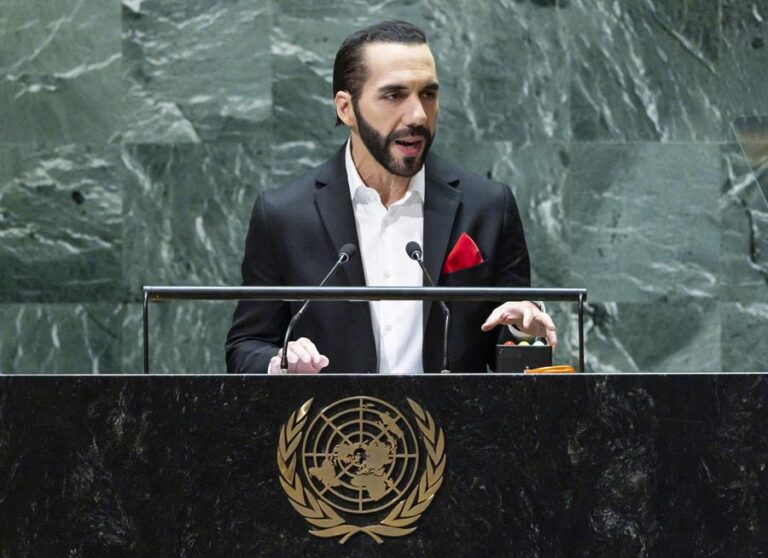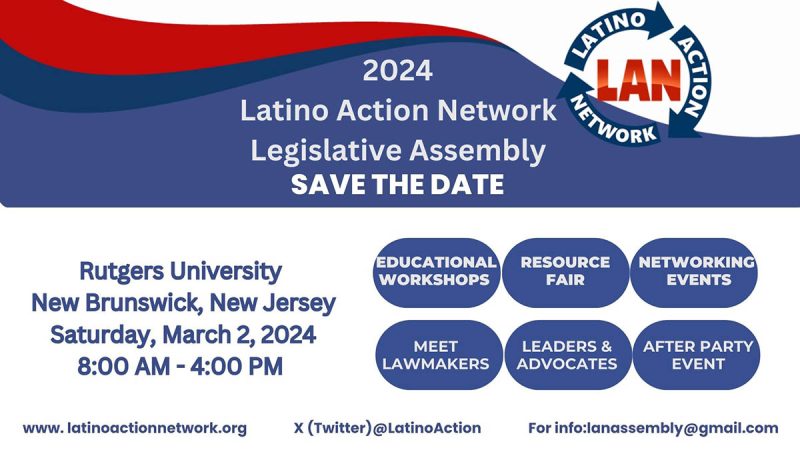
Security and human rights at odds in El Salvador
By Hugo Sánchez
San Salvador, Jan 30 (EFE). –
Security and human rights are at odds in El Salvador under the presidency of Nayib Bukele, who enjoys high popularity but is also criticized for his authoritarianism, concentrating power, and alleged abuses in his crusade against gangs.
Bukele, who is seeking immediate re-election in 2024, even though the constitution prohibits it, has not made any proposals, but has called for a vote for his party to maintain an absolute majority in Congress and thus be able to continue his so-called “war on gangs.”
The latest polls give him between 70.9% and 81.9% of the vote, which means he would win in the first round with a considerable advantage over his opponents.
The “war on gangs”
In March 2022, President Nayib Bukele declared a state of emergency in response to a brutal gang massacre that left 87 people dead.
Nearly two years later, polls show his popularity is based on this measure, which suspended constitutional guarantees like the right to legal defense and the inviolability of communications, and which was approved and extended by Congress at Bukele’s request.
The ruling party claims that the state of emergency has allowed the security forces to detain thousands of suspected gangsters who once openly controlled entire communities.
More than 75,100 individuals have been arrested, and some 7,000 have been released with conditions. Bukele accuses all of them of being gang members or associates.
El Salvador closed 2023 with a reported rate of 2.4 homicides per 100,000 inhabitants, adding eight consecutive years of reduction since 2015 when the rate was 103.

Human Rights Violations
According to Amnesty International, Bukele’s so-called “war on gangs” has had a negative impact on human rights and has led to a crisis in El Salvador that could be the worst since the end of the civil war (1980-1992).
Human rights defenders, including opposition presidential candidates, estimate the number of arbitrary arrests at up to 20,000.
A conglomerate of NGOs says it has treated more than 6,000 victims of abuses and that there have been more than 200 deaths of detainees in prisons, some with signs of torture.
Bukele’s government has more than 100,000 prisoners and would have incarcerated more than 1% of the country’s population.
Officials estimate that between 18,000 and 20,000 suspected gang members are still at large.
For David Morales, of the Cristosal organization and a former human rights lawyer, the government will end its five-year period “having caused the most human rights violations since the signing of the Peace Accords in 1992.”
“The security strategy, which consists of an unconstitutional state of emergency, has caused massive violations of human rights,” Morales told EFE.
“Torture has been established as a state policy,” he added while pointing out that beyond the state of emergency, “the current government has not been able to establish a comprehensive security policy.”

Hostility against the press
El Salvador’s Special Rapporteur on Freedom of Expression for Journalists, Gabriel Labrador, told EFE that “there has been constant pressure from the government to limit freedom of expression and freedom of the press.”
“The Bukele government shows two faces: A friendly face towards the press that doesn’t question it and is close to its interests, and a hostile face towards the independent press that is not close to its propaganda interests,” he commented.
Labrador warned that since Bukele came to power, “attacks against journalists have increased,” from 77 in 2019 to 293 in 2023, more than 280%.
“It is worrying that the government or its spokespersons have never called for an end to the attacks against journalists,” the rapporteur said.
“When the legal, physical and mental security of journalists has been attacked, some government officials have expressed their approval without authorities like President Bukele censoring these expressions,” he added.
An economy in the doldrums
The same polls that indicate Bukele’s high popularity and his emergency regime show that the economy is his biggest liability.
In 2021, Bukele made bitcoin legal tender, predicting that the cryptocurrency would be worth around $100,000 and betting that Salvadorans would send massive family remittances using digital wallets, but more than two years later, his dream is far from reality.
In fact, the country remains the least growing in Central America, with monetary poverty rising from 22.8% of households to 26.6% in 2019, a growth of 3.8 percentage points.
And extreme poverty,as measured by the Multiple Purpose Household Survey, went from 4.5% of households in 2019 to 8.6% in 2022.
According to a survey by the University Institute of Public Opinion, 32.8% of the population believes that the “main problem of El Salvador” is the economy, while unemployment reaches 17.3%. EFE
hs/mcd/ics


